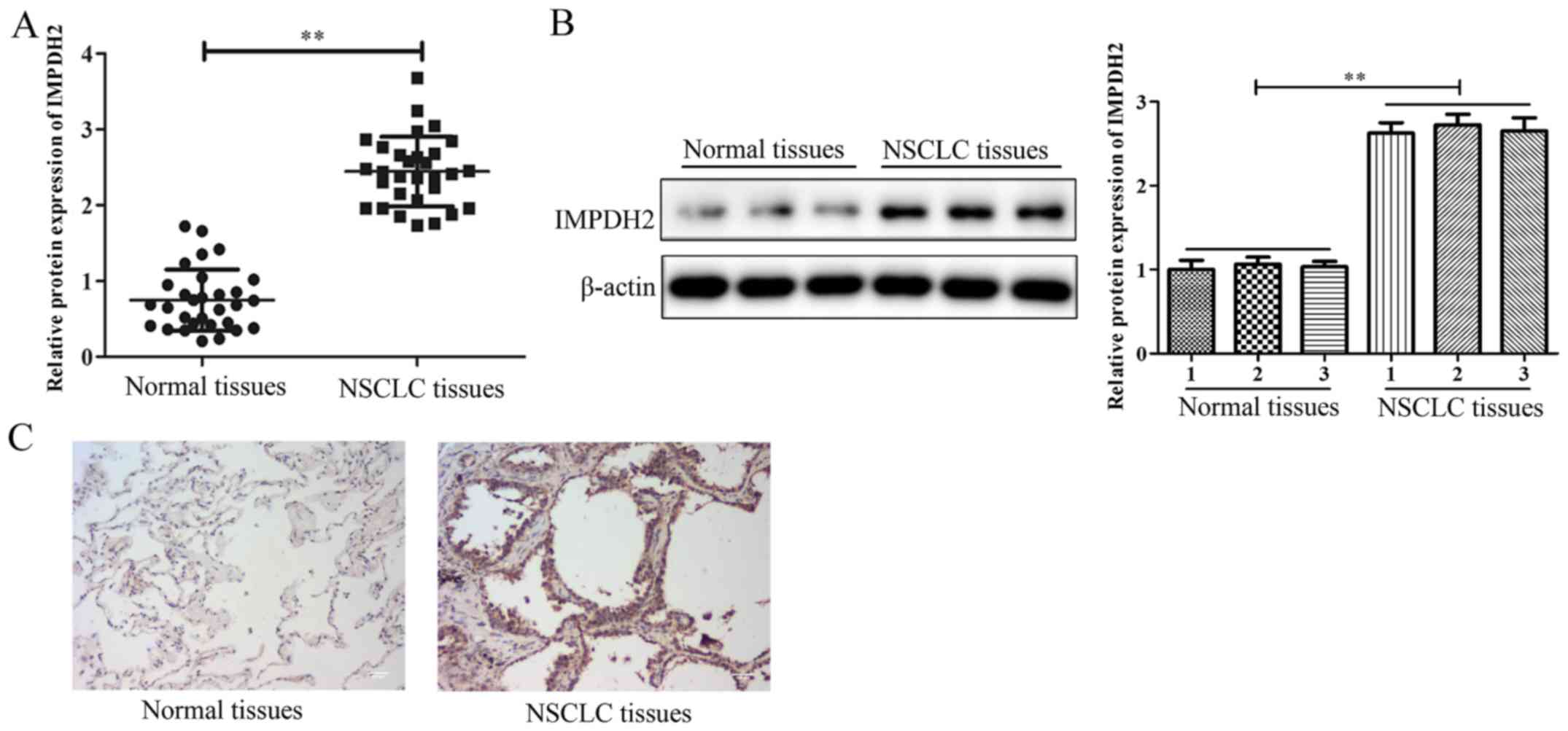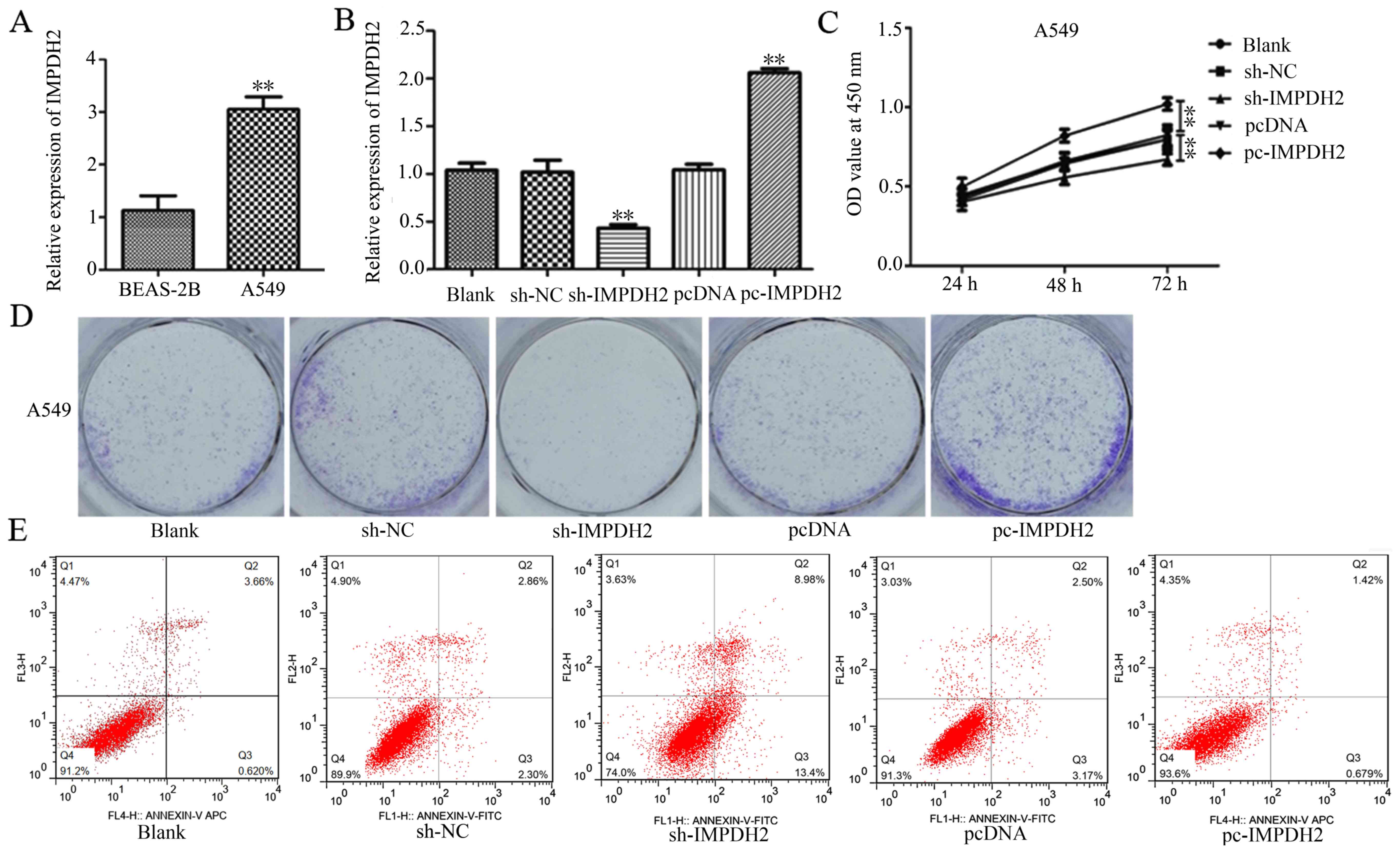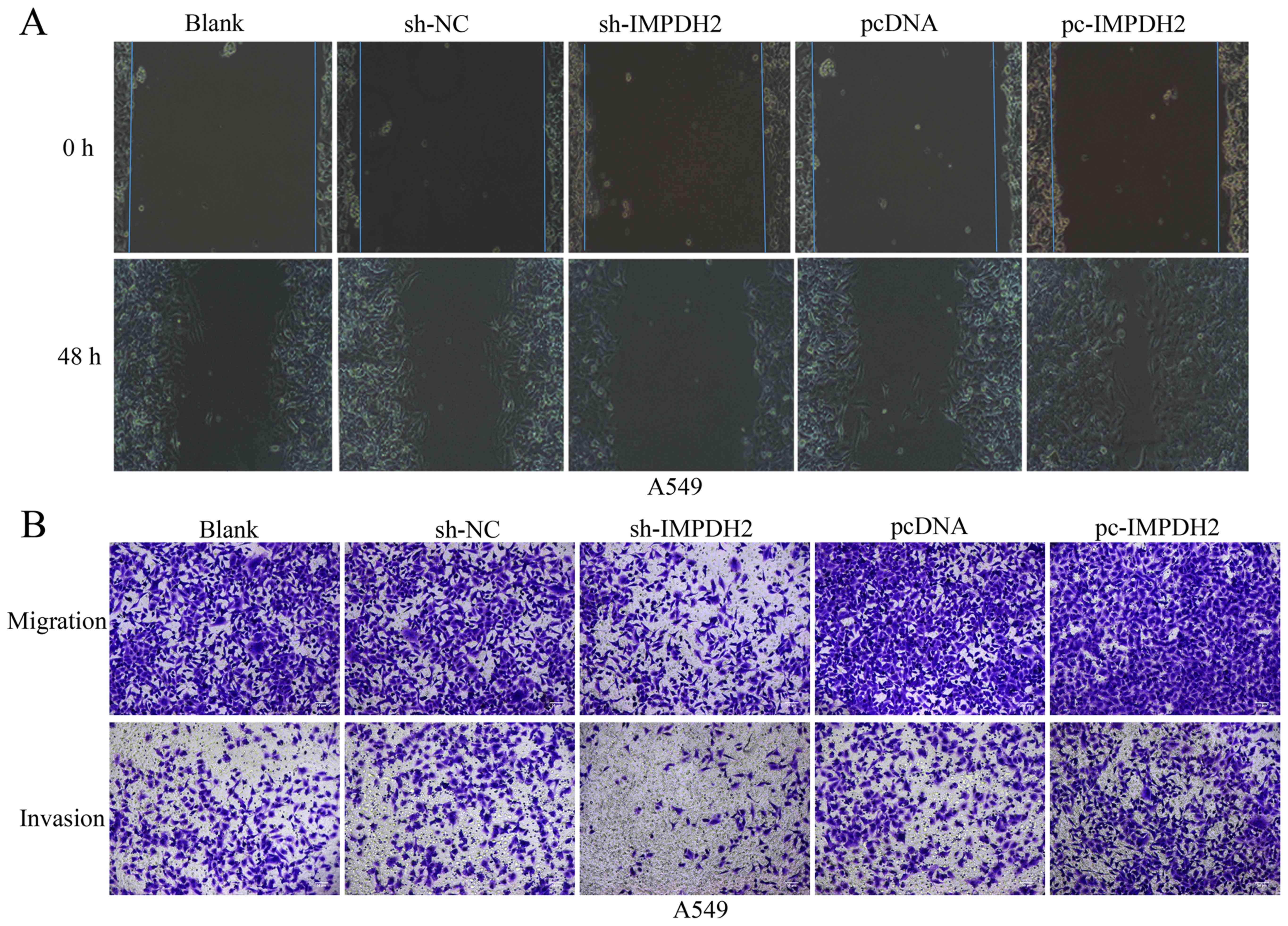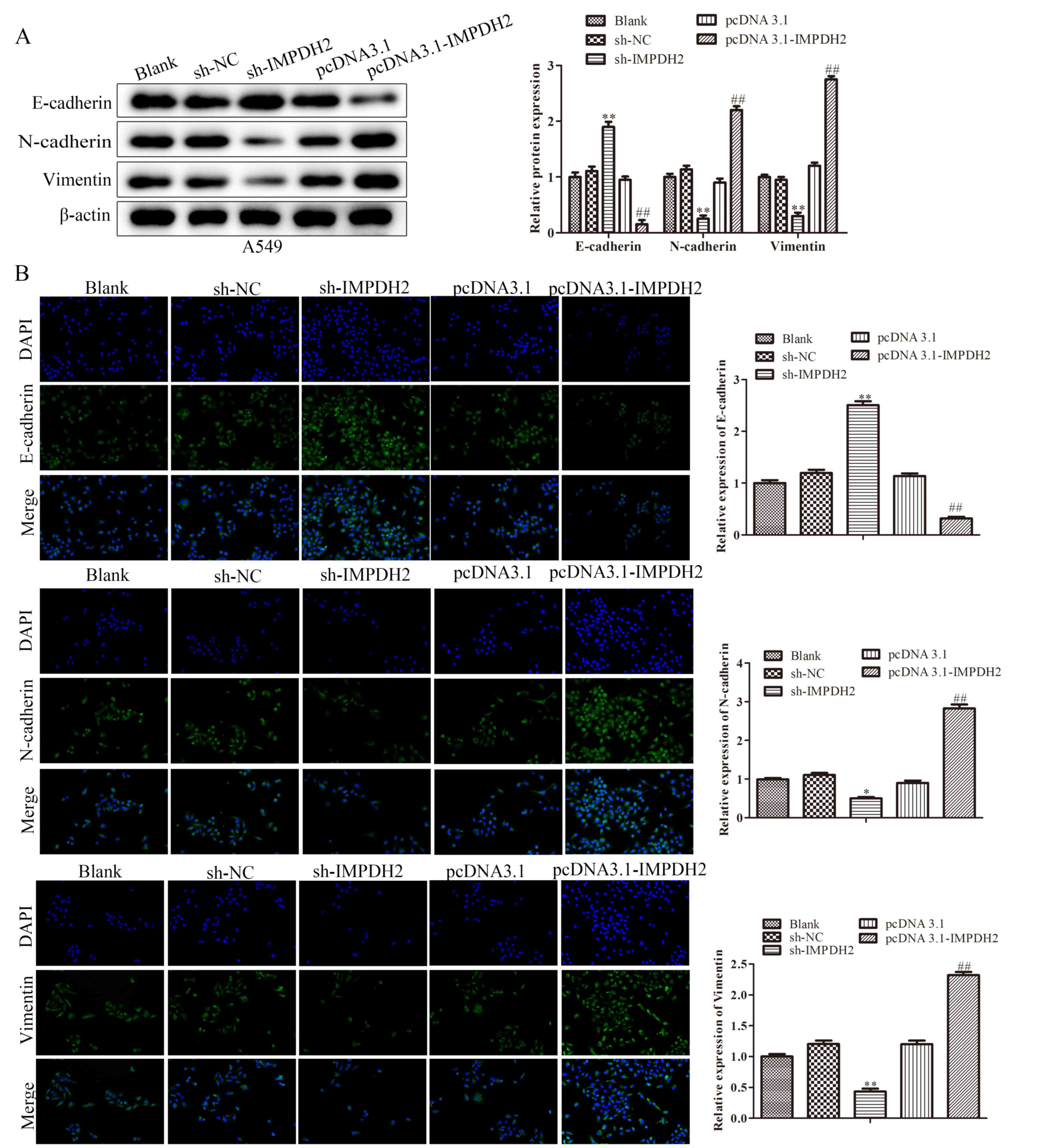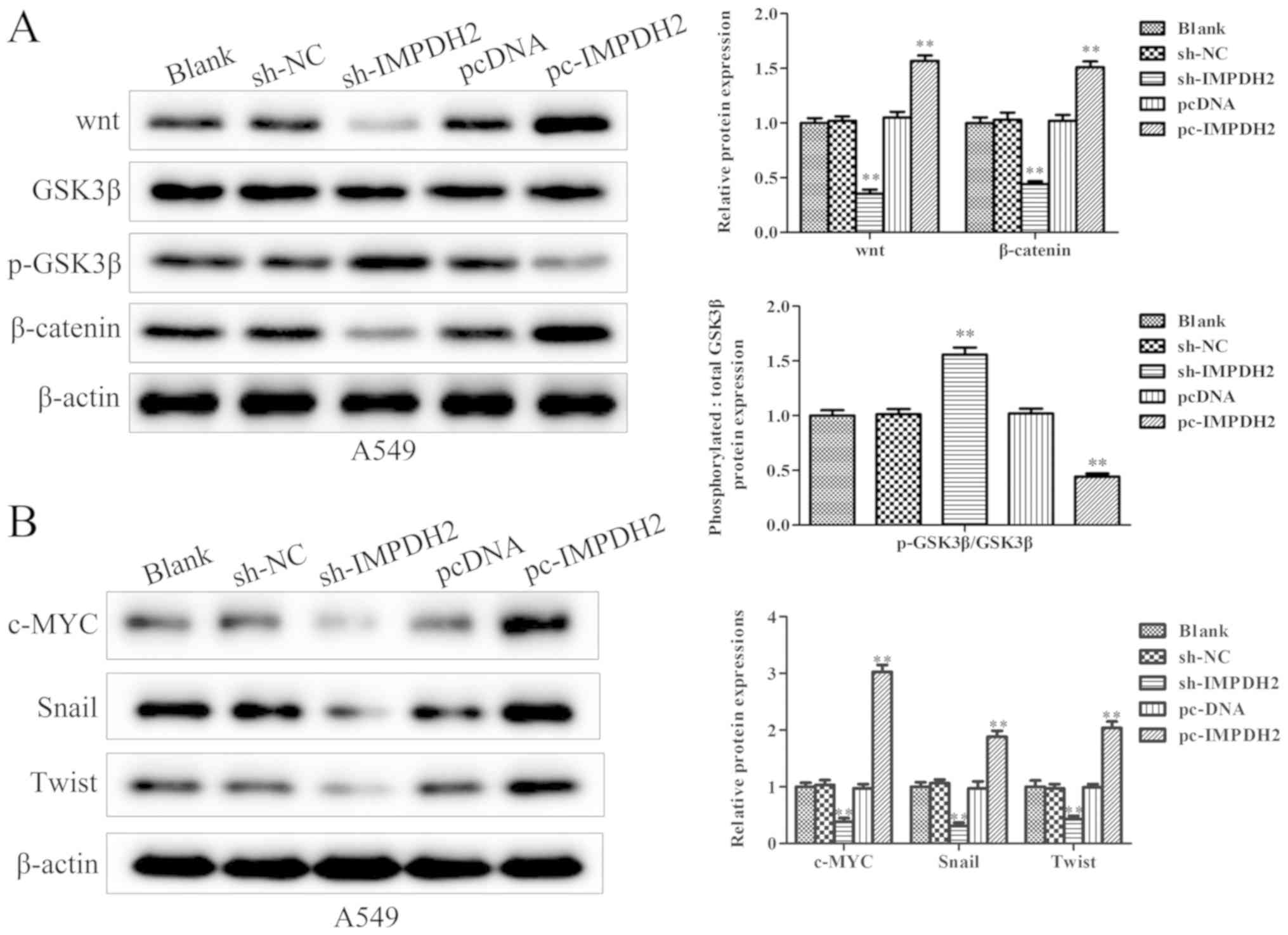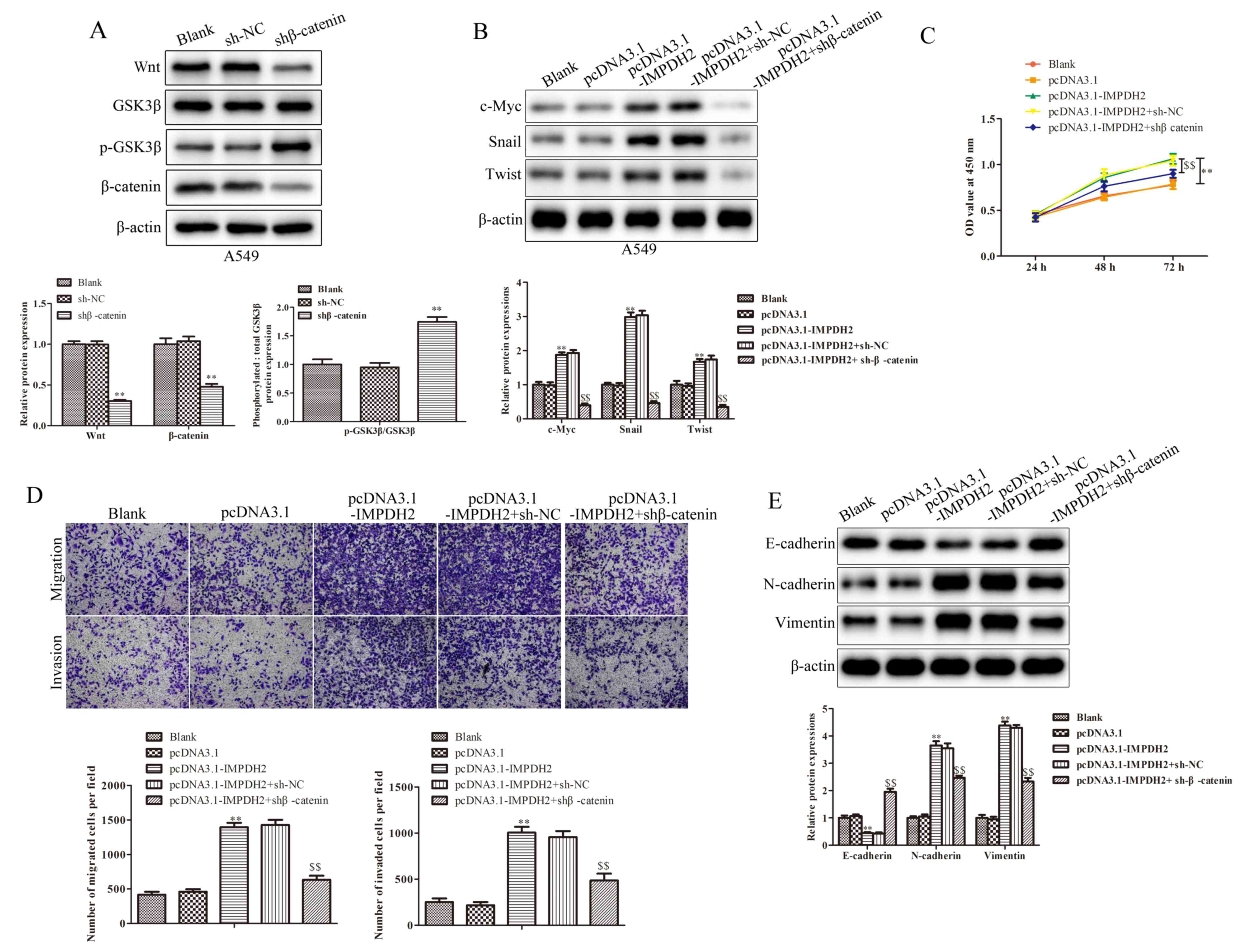|
1
|
Bray F, Ferlay J, Soerjomataram I, Siegel
RL, Torre LA and Jemal A: Global cancer statistics 2018: GLOBOCAN
estimates of incidence and mortality worldwide for 36 cancers in
185 countries. CA Cancer J Clin. 68:394–424. 2018. View Article : Google Scholar : PubMed/NCBI
|
|
2
|
Liu R, Chen Y, Shou T, Hu J and Qing C:
miRNA-99b-5p targets FZD8 to inhibit non-small cell lung cancer
proliferation, migration and invasion. Onco Targets Ther.
12:2615–2621. 2019. View Article : Google Scholar : PubMed/NCBI
|
|
3
|
Miller KD, Nogueira L, Mariotto AB,
Rowland JH, Yabroff KR, Alfano CM, Jemal A, Kramer JL and Siegel
RL: Cancer treatment and survivorship statistics, 2019. CA Cancer J
Clin. 69:363–385. 2019. View Article : Google Scholar : PubMed/NCBI
|
|
4
|
Zimmermann AG, Spychala J and Mitchell BS:
Characterization of the human inosine-5-momophosphate dehydrogenase
type II gene. J Biol Chem. 270:6808–6814. 1995. View Article : Google Scholar : PubMed/NCBI
|
|
5
|
Dorn AR, Mountain LD, Ghoshal M, Hui RA,
Klinedinst LK, Rugaber JE, Schamerloh AF and Salamone SJ: The use
of inosine 5′-monophosphate dehydrogenase (IMPDH) in the
development of a new liquid homogeneous enzyme immunoassay
technology. Clin Chem. 47:1921–1922. 2001. View Article : Google Scholar
|
|
6
|
Carr SF, Papp E, Wu JC and Natsumeda Y:
Characterization of human type I and type II IMP dehydrogenases. J
Biol Chem. 266:27286–27290. 1993.
|
|
7
|
Colby TD, Vanderveen K, Strickler MD,
Markham GD and Goldstein BM: Crystal structure of human type II
inosine monophosphate dehydrogenase: Implications for ligand
binding and drug design. Proc Natl Acad Sci USA. 96:3531–3536.
1999. View Article : Google Scholar : PubMed/NCBI
|
|
8
|
Duan S, Huang W, Liu X, Liu X, Chen N, Xu
Q, Hu Y, Song W and Zhou J: IMPDH2 promotes colorectal cancer
progression through activation of the PI3K/AKT/mTOR and
PI3K/AKT/FOXO1 signaling pathways. J Exp Clin Canc Res. 37:3042018.
View Article : Google Scholar
|
|
9
|
Zhou L, Xia D, Zhu J, Chen Y, Chen G, Mo
R, Zeng Y, Dai Q, He H, Liang Y, et al: Enhanced expression of
IMPDH2 promotes metastasis and advanced tumor progression in
patients with prostate cancer. Clin Transl Oncol. 16:906–913. 2014.
View Article : Google Scholar : PubMed/NCBI
|
|
10
|
Zou J, Han Z, Zhou L, Cai C, Luo H, Huang
Y, Liang Y, He H, Jiang F, Wang C and Zhong W: Elevated expression
of IMPDH2 is associated with progression of kidney and bladder
cancer. Med Oncol. 32:3732015. View Article : Google Scholar : PubMed/NCBI
|
|
11
|
Kahlert UD, Nikkhah G and Maciaczyk J:
Epithelial-tomesenchymal(−like) transition as a relevant molecular
event in malignant gliomas. Cancer Lett. 331:131–138. 2013.
View Article : Google Scholar : PubMed/NCBI
|
|
12
|
Zhang X, Ke X, Pu Q, Yuan Y, Yang W, Luo
X, Jiang Q, Hu X, Gong YI and Tang K: MicroRNA-410 acts as oncogene
in NSCLC through downregulating SLC34A2 via activating
Wnt/β-catenin pathway. Oncotarget. 7:14569–14585. 2016. View Article : Google Scholar : PubMed/NCBI
|
|
13
|
Clevers H: Wnt/beta-catenin signaling in
development and disease. Cell. 127:469–480. 2006. View Article : Google Scholar : PubMed/NCBI
|
|
14
|
Livak KJ and Schmittgen TD: Analysis of
relative gene expression data using real-time quantitative PCR and
the 2(-Delta Delta C(T)) methods. Methods. 25:402–408. 2001.
View Article : Google Scholar : PubMed/NCBI
|
|
15
|
Gao C, Yao H, Liu H, Feng Y and Yang Z:
TM4SF1 is a potential target for anti-invasion and metastasis in
ovarian cancer. BMC Cancer. 19:2372019. View Article : Google Scholar : PubMed/NCBI
|
|
16
|
Kozhevnikova EN, van der Knaap JA,
Pindyurin AV, Ozgur Z, van Ijcken WF, Moshkin YM and Verrijzer CP:
Metabolic enzyme IMPDH is also a transcription factor regulated by
cellular state. Mol Cell. 47:133–139. 2012. View Article : Google Scholar : PubMed/NCBI
|
|
17
|
Bairagya HR, Mukhopadhyay BP and Bera AK:
Role of salt bridge dynamics in inter domain recognition of human
IMPDH isoforms: An insight to inhibitor topology for isoform-II. J
Biomol Struct Dyn. 29:441–462. 2011. View Article : Google Scholar : PubMed/NCBI
|
|
18
|
Liu Y, Wang WM, Zou LY, Li LI, Feng LU,
Pan MZ, Lv MY, Cao Y, Wang H, Kung HF, et al: Ubiquitin specific
peptidase 5 mediates Histidine-rich protein Hpn induced cell
apoptosis in hepatocellular carcinoma through P14-P53 signaling.
Proteomics. 17:2017. View Article : Google Scholar
|
|
19
|
Jackson RC, Weber G and Morris HP: IMP
dehydrogenase, an enzyme linked with proliferation and malignancy.
Nature. 256:331–333. 1975. View
Article : Google Scholar : PubMed/NCBI
|
|
20
|
Collart FR, Chubb CB, Mirkin BL and
Huberman E: Increased inosine-5-phosphate dehydrogenase gene
expression in solid tumor tissues and tumor cell lines. Cancer Res.
52:5826–5828. 1992.PubMed/NCBI
|
|
21
|
Nagai M, Natsumeda Y and Weber G:
Proliferation-linked regulation of type II IMP dehydrogenase gene
in human normal lymphocytes and HL-60 leukemic cells. Cancer Res.
52:258–261. 1992.PubMed/NCBI
|
|
22
|
Zhao Y, Yang Y, Dai J, Xing D and Dong Y:
IMPDH2 is highly expressed in breast cancer and predicts
unfavourable prognosis. Biomarkers. 1–9. Jun 30–2018.(Online ahead
of print).
|
|
23
|
Xu Y, Zheng Z, Gao Y, Duan S, Chen C, Rong
J, Wang K, Yun M, Weng H, Ye S and Zhang J: High expression of
IMPDH2 is associated with aggressive features and poor prognosis of
primary nasopharyngeal carcinoma. Sci Rep. 7:7452017. View Article : Google Scholar : PubMed/NCBI
|
|
24
|
Zimmermann AG, Wright KL, Ting JP and
Mitchell BS: Regulation of inosine-5′-monophosphate dehydrogenase
type II gene expression in human T cells. Role for a novel 5
palindromic octamer sequence. J Biol Chem. 272:22913–22923. 1997.
View Article : Google Scholar : PubMed/NCBI
|
|
25
|
Wu TY, Peng Y, Pelleymounter LL, Moon I,
Eckloff BW, Wieben ED, Yee VC and Weinshilboum RM: Pharmacogenetics
of the mycophenolic acid targets inosine monophosphate
dehydrogenases IMPDH1 and IMPDH2: Gene sequence variation and
functional genomics. Br J Pharmacol. 161:1584–1598. 2010.
View Article : Google Scholar : PubMed/NCBI
|
|
26
|
Ishitsuka K, Hideshima T, Hamasaki M, Raje
N, Kumar S, Podar K, Gouill SL, Shiraishi N, Yasui H, Roccaro AM,
et al: Novel inosine monophosphate dehydrogenase inhibitor VX-944
induces apoptosis in multiple myeloma cells primarily via
caspase-independent AIF/Endo G pathway. Oncogene. 24:5888–5896.
2005. View Article : Google Scholar : PubMed/NCBI
|
|
27
|
Pua KH, Stiles DT, Sowa ME and Verdine GL:
IMPDH2 is an intracellular target of the cyclophilin A and
sanglifehrin A complex. Cell Rep. 18:432–442. 2017. View Article : Google Scholar : PubMed/NCBI
|
|
28
|
Guo Q, Huang Y, Xu J, Wang W, Gao J, Su Y,
Gu Y and Yin X: Long non-coding RNA BANCR contributes to cervical
adenocarcinoma migration by affecting epithelial-mesenchymal
transition. Eur J Gynaecol Oncol. 40:408–412. 2019.
|
|
29
|
Thiery JP, Acloque H, Huang RY and Nieto
MA: Epithelial-mesenchymal transitions in development and disease.
Cell. 139:871–890. 2009. View Article : Google Scholar : PubMed/NCBI
|
|
30
|
Gavert N and Ben-ZeEv A:
Epithelial-mesenchymal transition and the invasive potential of
tumors. Trends Mol Med. 14:199–209. 2008. View Article : Google Scholar : PubMed/NCBI
|
|
31
|
Lamouille S, Xu J and Derynck R: Molecular
mechanisms of epithelial-mesenchymal transition. Nat Rev Mol Cell
Biol. 15:178–196. 2014. View
Article : Google Scholar : PubMed/NCBI
|
|
32
|
Yilmaz M and Christofori G: EMT, the
cytoskeleton, and cancer cell invasion. Cancer Metastasis Rev.
28:15–33. 2009. View Article : Google Scholar : PubMed/NCBI
|
|
33
|
Wheelock MJ, Shintani Y, Maeda M, Fukumoto
Y and Johnson KR: Cadherin switching. J Cell Sci. 121((Pt 6)):
727–735. 2008. View Article : Google Scholar : PubMed/NCBI
|
|
34
|
Rao TP and Kühl M: An updated overview on
Wnt signaling pathways: A prelude for more. Circ Res.
106:1798–1806. 2010. View Article : Google Scholar : PubMed/NCBI
|
|
35
|
Bienz M and Clevers H:
Armadillo/beta-catenin signals in the nucleus-proof beyond a
reasonable doubt. Nat Cell Biol. 5:179–182. 2003. View Article : Google Scholar : PubMed/NCBI
|
|
36
|
Li K, Pan W, Ma Y, Xu X, Gao Y, He Y, Wei
L and Zhang J: A novel oncogene TRIM63 promotes cell proliferation
and migration via activating Wnt/β-catenin signaling pathway in
breast cancer. Pathol Res Pract. 215:1525732019. View Article : Google Scholar : PubMed/NCBI
|
|
37
|
Segditsas S and Tomlinson I: Colorectal
cancer and genetic alterations in the Wnt pathway. Oncogene.
25:7531–7537. 2006. View Article : Google Scholar : PubMed/NCBI
|
|
38
|
Yang J, Chen J, He J, Li J, Shi J, Cho WC
and Liu X: Wnt signaling as potential therapeutic target in lung
cancer. Expert Opin Ther Targets. 20:999–1015. 2016. View Article : Google Scholar : PubMed/NCBI
|
|
39
|
Puisieux A, Brabletz T and Caramel J:
Oncogenic roles of EMT-inducing transcription factors. Nat Cell
Biol. 16:488–494. 2014. View Article : Google Scholar : PubMed/NCBI
|
|
40
|
Mannava S, Grachtchouk V, Wheeler LJ, Im
M, Zhuang D, Slavina EG, Mathews CK, Shewach DS and Nikiforov MA:
Direct role of nucleotide metabolism in C-MYC-dependent
proliferation of melanoma cells. Cell Cycle. 7:2392–2400. 2008.
View Article : Google Scholar : PubMed/NCBI
|















